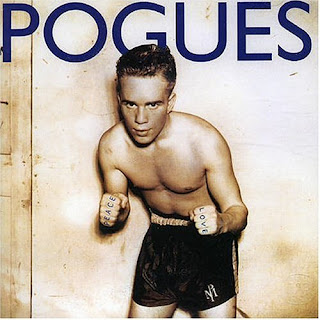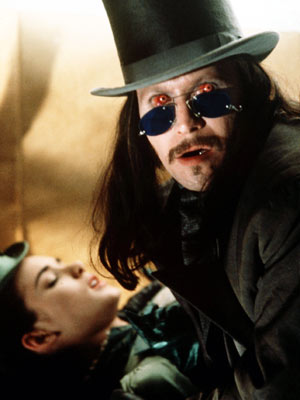Well? Why does it? Short answer: I don't know. Long answer: I have a theory
To start with, I don't literally believe all modern music sucks. Actually, there are a lot of "modern" artists that I like: Blink-182, Escape the Fate, Senses Fail, The Killers, etc. However, within the last decade, and especially within the last five years, there's been a major downturn in the music entering the pop world. When the abominations called "That's What I Call Music" came out, I'd often hear a couple of songs on the albums that I'd like; Bowling for Soup's 1985, the occasional Crossfade song, even the Killer's "Somebody Told Me." Now, however, I haven't heard a song from before 2005 on the radio that I can really stand, with the exception of the alternative stations. Now, I understand that Pop music has sucked for a long time, but why the hell is it getting worse?
Before I go on, I'm gonna quote my idol, Alice Cooper, on why HE (and he's been ruling the music world for over years) thinks. "Kids these days, they have all these catchy tunes, but their songs are just the saaaame thing over and over again. They don't feel their music at all. You're angry. I get it. Some girl or boy broke your heart. I get it. You're just putting out tunes, not real music." I think that Alice has it right there, that a lot of bands aren't feeling their music anymore, and the popular ones aren't feeling them period. I've heard Taylor Swift (my sisters listen, I live in a small house. I'm not gay) and Justin Bieber and the Jonas Bros. and all that other pop-music garbage; that's exactly what it is, garbage. Oh, musically, I'll admit the Bros. can play and Taylor Swift has a nice voice, but they sing about the same "feel good" crap in every single song. It's all about love (or a facsimile thereof) and self-esteem. The human touch is starting to evaporate from a lot of pop-music. Listen to your classic rock, or even modern alternative, and you get a sense of connection. There's a difference between Miley Cyrus talking about some guy who broke her heart, when she's never experienced more than the typically awkward and painful teenage relationship crap, and Buddy Nielsen of Senses Fail who really had his life butchered by a broken relationship. It comes out in the music. Now I realize contrasting Pop music with Post Hardcore may be a little unfair, but even if you look at older bands in the same genre, the problem remains. Looking at the old Good Charlotte (a talented band whatever you may think of their music) it was perfectly apparent that the Madden bros. had grown up in a significantly less privilaged environment than Miley had.
True enough, a lot of pop is meant to appeal to teenagers. Even there, modern pop is doing nothing but screwing the proverbial pooch. Blink-182, Bowling for Soup, Good Charlotte, the early Green Day; they all appealed to teenagers in a much more real sense than these Disney-backed disasters do. And why? Once again, the aforementioned bands FELT their music. I can think of no better band than Blink for expressing how teens feel. Life isn't all about self-esteem, sometimes life is shit and "It'll happen once again, You'll turn to a friend, Someone who understands, Sees through the master plan, But everybody's gone, And you've been here for too long, To face this on your own, Well I guess this is growing up." That's teenage life, in my experience anyway, not this highschool musical jonas bros. bullcrap. I'll admit, Blink-182 aren't the most talented bunch (save for Travis Barker. aMAZING drummer), but their relatively simple sound has a broader, more real, and quite versatile appeal. The Jonas Bros. rely on their good looks and self-esteem toting songs, and their time will soon be over. It ain't your skill that matters, it's your heart.
The other problem I have with a lot of modern pop is this; it all sounds the SAME. I know the sounds of Alice Cooper, of Social Distortion, of the Ramones, of the Clash, of the Sex Pistols, of AC/DC, of Aerosmith, of the Killers, of Socratic, of Blink, the list goes on. I turn on the radio, and I have no friggin' idea who's playing. Now, in a sense, I've been spoiled musically, because my dad insisted on my exposure being very broad, from Celtic to New Age to Jazz to Blues to Classic Rock. Hell, my first favorite rockband was Creedence Clearwater Revival. But as I look through all these "old" albums, watch all these "old" interviews, I see a variety of influence. Alice Cooper was influenced by everything from the Beatles to Elvis to Chuck Berry and the Stones, and then he injected his own sound. Aerosmith took influence from bluegrass, blues, and jazz just as much from the Stones. Social Distortion owed just as much to Johnny Cash as it did to the Ramones. Ozzy listened to British folk (often all lumped, quite incorrectly and to my fury, into the category of "celtic") just as much as he listened to the Beatles. Even classical music wormed its influence into the most unlikely corners of music; Randy Rhoades was a classical guitarist. Now, though, the influences are all the same; a bit of the Beatles, and then the power-pop and New Wave of the late 80s to 90s, and hence it ALLLL sounds the same. There is so much good music out there, and if you look at the influences of any good musician or band, and they will be diverse. If I was to list my influences as a musician, there'd be as much Folk as there would be rock, and even the rock would be diverse. Yes, Alice Cooper would be there, Social Distortion, Green Day, but there would be Andy M. Stewart, Tom Waits, Voltaire, Mauro Giuliani (whose method of classical guitar I subscribe to) and Vivaldi. The Jonas Bros. list Switchfoot and Prince, both of which are pop, and mediocre at best (no apologies are coming for that comment, don't even start with me.) Even if they listed Michael Jackson, who I loathe, at least it would be original. Just as eating only candy leads to ill physical health, lack of a varied musical influence will lead to crappy and unoriginal music. I'm not saying your influences can't come mostly from one genre, in fact, they probably should, because sound should be relatively concrete, but it should come OUT in your music. You can tell Aerosmith had a broad influence. Even (and I loathe to say it because I despise them SO VERY MUCH) Nirvana had a broad influence and it showed (they still blow. Just compared to Jonas Bros., they're decent.) Pearl Jam, The Cure, the Cult, Garbage, the Pogues...they all showed their influences and the broad range of music that influenced them, and so they all had a distinct style. Modern pop music....generally sounds the same.
Now, there is hope yet for music. Bands like The Killers, Matchbox Twenty, Socratic, and Fountains of Wayne are all "pop" bands that I enjoy and that are highly original. Alice Cooper and Ozzy Osbourne are still shaking things up too. Even Tom Waits will be putting out new stuff shortly. However, these guys are all gaining in years. Even the more modern bands like Blink-182 are pushing 40. Green Day's pretty much gone, their last album sucking like you wouldn't believe, and Good Charlotte having to redeem themselves from their last album, which I'll admit didn't COMPLETELY suck, but it was right up there. However, until the Popular Music world stops catering to teeny boppers, I think the musical depression we're in is gonna be lasting for a while. At least we still have classic rock and alternative stations, and that wonder of the modern world, that saviour of civilization...iTunes.
















